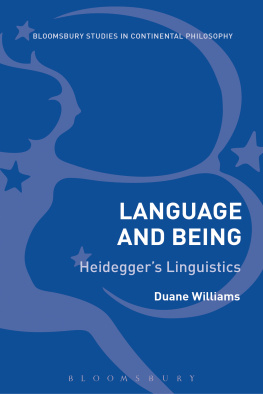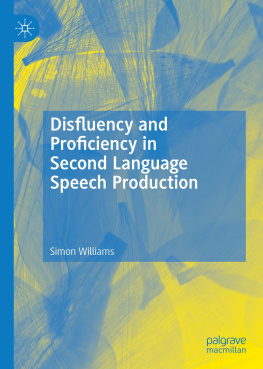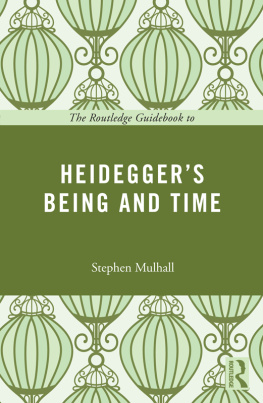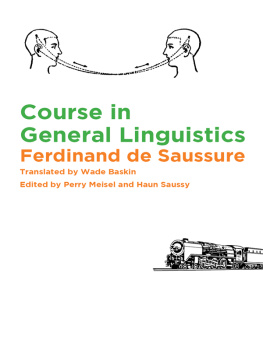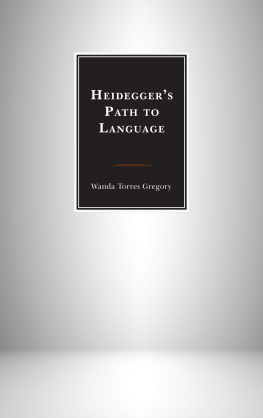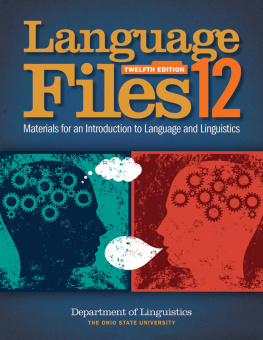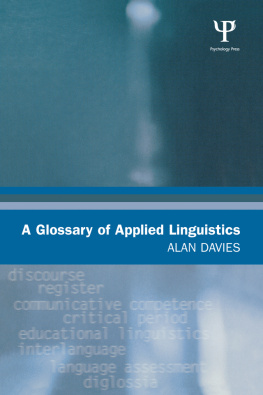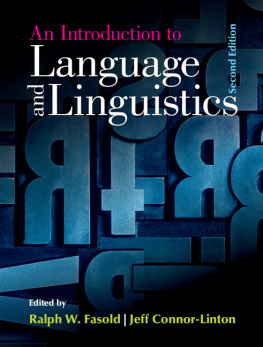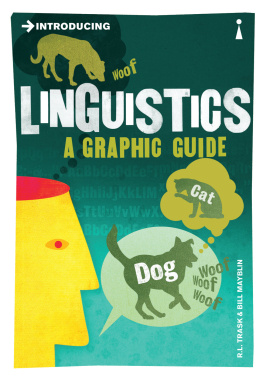Duane Williams - Language and Being: Heideggers Linguistics
Here you can read online Duane Williams - Language and Being: Heideggers Linguistics full text of the book (entire story) in english for free. Download pdf and epub, get meaning, cover and reviews about this ebook. City: London;New York, year: 2019, publisher: Bloomsbury Academic, genre: Romance novel. Description of the work, (preface) as well as reviews are available. Best literature library LitArk.com created for fans of good reading and offers a wide selection of genres:
Romance novel
Science fiction
Adventure
Detective
Science
History
Home and family
Prose
Art
Politics
Computer
Non-fiction
Religion
Business
Children
Humor
Choose a favorite category and find really read worthwhile books. Enjoy immersion in the world of imagination, feel the emotions of the characters or learn something new for yourself, make an fascinating discovery.
- Book:Language and Being: Heideggers Linguistics
- Author:
- Publisher:Bloomsbury Academic
- Genre:
- Year:2019
- City:London;New York
- Rating:5 / 5
- Favourites:Add to favourites
- Your mark:
- 100
- 1
- 2
- 3
- 4
- 5
Language and Being: Heideggers Linguistics: summary, description and annotation
We offer to read an annotation, description, summary or preface (depends on what the author of the book "Language and Being: Heideggers Linguistics" wrote himself). If you haven't found the necessary information about the book — write in the comments, we will try to find it.
Language and Being: Heideggers Linguistics — read online for free the complete book (whole text) full work
Below is the text of the book, divided by pages. System saving the place of the last page read, allows you to conveniently read the book "Language and Being: Heideggers Linguistics" online for free, without having to search again every time where you left off. Put a bookmark, and you can go to the page where you finished reading at any time.
Font size:
Interval:
Bookmark:

Language and Being
Bloomsbury Studies in Continental Philosophy
Presents cutting edge scholarship in the field of modern European thought. The wholly original arguments, perspectives and research findings in titles in this series make it an important and stimulating resource for students and academics from across the discipline.
Breathing with Luce Irigaray , edited by Lenart Skof and Emily A. Holmes
Deleuze and Art , Anne Sauvagnargues
Deleuze and the Diagram: Aesthetic Threads in Visual Organization
, Jakub Zdebik
Derrida, Badiou and the Formal Imperative , Christopher Norris
Desire in Ashes: Deconstruction, Psychoanalysis, Philosophy , edited by Simon Morgan Wortham and Chiara Alfano
Early Phenomenology , edited by Brian Harding and Michael R. Kelly
Egalitarian Moments , Devin Zane Shaw
Ernst Bloch and His Contemporaries , Ivan Boldyrev
Why there is no Post-Structuralism in France , Johannes Angermuller
Gadamers Poetics: A Critique of Modern Aesthetics , John Arthos
Heidegger, History and the Holocaust , Mahon OBrien
Heidegger and the Emergence of the Question of Being , Jess Adrin Escudero
Husserls Ethics and Practical Intentionality , Susi Ferrarello
Immanent Transcendence: Reconfiguring Materialism in Continental Philosophy , Patrice Haynes
Merleau-Pontys Existential Phenomenology and the Realization of Philosophy , Bryan A. Smyth
Mortal Thought: Hlderlin and Philosophy , James Luchte
Nietzsche and Political Thought , edited by Keith Ansell-Pearson
Nietzsche as a Scholar of Antiquity , Helmut Heit
Philosophy, Sophistry, Antiphilosophy: Badious Dispute with Lyotard , Matthew R. McLennan
The Poetic Imagination in Heidegger and Schelling , Christopher Yates
Post-Rationalism: Psychoanalysis, Epistemology, and Marxism in Post-War France , Tom Eyers
Revisiting Normativity with Deleuze , edited by Rosi Braidotti and Patricia Pisters
Towards the Critique of Violence: Walter Benjamin and Giorgio Agamben , Brendan Moran and Carlo Salzani
For Louise
Language and Being
Heideggers Linguistics
Duane Williams
Bloomsbury Academic
An imprint of Bloomsbury Publishing Plc

Contents
From the outset, nobody has anticipated or encouraged this book more than Hkon Fyhn. And resonating in deep crevices between the lines of this work are many of our forest and mountain conversations over the course of two decades. I cannot thank him enough for maintaining so much belief in this book and for providing such profound inspiration.
I count myself as one of a few lucky people honoured to be within a circle the pivot of which is a Socrates of our times, Joseph Milne. He is a lighthouse and a rock and I cannot overestimate his guidance and support. For their part in helping me to hammer and shape thoughts in the heat of many discussions, I must also thank the band of brothers within that now widely spread circle: Alexandre Christoyannopoulos, Brian Edwards, Valentin Gerlier, David Lewin and Todd Mei.
Gratitude goes to the many talented scholars I work with, especially Patrice Haynes, Simon Podmore and Steven Shakespeare, and the administrators Ursula Boote, Ann Houghton, Karen Quinn and Lauren Whiston who always look out for me. I would also like to show my warm appreciation to George Pattison for the generous advice, encouragement and support he provided when reviewing a proposal for this book.
Although they are far away, it gives me strength to know that my family, especially mum, dad, Emma, Derek and Claire, are always there. Finally, I would like to thank Louise Emberson. You are beauty, truth and goodness personified, and this book is dedicated to you for making it possible in so many ways.
When referring to Being and Time I tend to draw from the 1962 translation by John Macquarrie and Edward Robinson, alongside the 1996 translation by Joan Stambaugh. However, any direct quotations are from the Stambaugh translation. I have decided not to use the Stambaugh translation revised by Dennis J. Schmidt in 2010 for the simple reason that this uses Greek characters in the text for Greek words, and for this book I felt Stambaughs transliteration would be more helpful for the reader. All references to works by Heidegger contain page numbers, except Being and Time where, following convention, references are to margin numbers. For Heideggers essay The Way to Language, I use the translation by Peter D. Hertz in On the Way to Language , except for one occasion when I use the translation by David Farrell Krell in Basic Writings because it suits my purpose better. Finally, I should explain that I tend to use the word man when referring to humanity as a whole. This is simply to tie in with Heideggers own use of the word Mensch , which like the Latin homo and Greek anthrpos means human being and so includes women. This contrasts with Mann , which like the Latin vir and Greek anr means a male man as distinct from a female woman.
| AWH | As When On Holiday ... |
| Wie Wenn Am Feiertage ... 1939, lecture in GA 4, tr. K. Hoeller in EHP. | |
| BDT | Building, Dwelling, Thinking |
| Bauen Wohnen Denken 1951, lecture in GA 7, tr. A. Hofstadter in PLT; also in BW. | |
| BT | Being and Time |
| Sein und Zeit 1927, book, GA 2, tr. J. Stambaugh, Albany: SUNY Press, 1996; also, tr. J. Macquarrie and E. Robinson, New York: Harper & Row, 1962. | |
| BW | Basic Writings |
| Heidegger, Martin, Basic Writings , ed. David Farrell Krell (London: Routledge, 1978). | |
| CP | Contributions to Philosophy ( From Ereignis ) |
| Beitrge zur Philosophie ( Vom Ereignis ) 1936-38, book draft, GA 65, tr. as Contributions to Philosophy ( From Enowning ) by P. Emad and K. Maly, Bloomington and Indianapolis: Indiana University Press, 1999. | |
| DL | A Dialogue on Language |
| Aus einum Gesprch von der Sprache 1953-54, dialogue in GA 12, tr. P. Hertz in OWL. | |
| DS | Der Spiegel Interview |
| Spiegel-Gesprch mit Martin Heidegger 1966, interview; in GA 16, tr. J. Veith in The Heidegger Reader , Bloomington and Indianapolis: Indiana University Press, 2007. | |
| EHP | Elucidations of Hlderlins Poetry |
| Erluterungen zu Hlderlins Dichtung 1944 and after, essay collection, GA 4, tr. K. Hoeller, New York: Humanity Books, 2000. | |
| EP | The End of Philosophy and the Task of Thinking |
| Das Ende der Philosophie und die Aufgabe des Denkens 1964, lecture in GA 14, tr. J. Stambaugh in BW. | |
| HE | Hlderlin and the Essence of Poetry |
| Hlderlin und das Wesen der Dictung 1936, lecture in GA 4, tr. K. Hoeller, in EHP. | |
| HR | The Heidegger Reader |
| Heidegger Lesebuch 2007, essay collection, ed. Gnter Figal, tr. J. Veith, Bloomington and Indianapolis: Indiana University Press, 2009. | |
| ID | Identity and Difference |
| Identitat und Differenz 1957, lectures; GA 11, tr. J. Stambaugh, New York: Harper & Row, 1969. | |
| IM | Introduction to Metaphysics |
| Einfhrung in die Metaphysik 1935, lecture-course, GA 40, tr. G. Fried & R. Polt, New Haven: Yale University Press, 2000. | |
| L | Language |
| Die Sprache 1959, lecture, in Unterwegs zur Sprache , GA 40, tr. A. Hofstadter, in PLT. |
Font size:
Interval:
Bookmark:
Similar books «Language and Being: Heideggers Linguistics»
Look at similar books to Language and Being: Heideggers Linguistics. We have selected literature similar in name and meaning in the hope of providing readers with more options to find new, interesting, not yet read works.
Discussion, reviews of the book Language and Being: Heideggers Linguistics and just readers' own opinions. Leave your comments, write what you think about the work, its meaning or the main characters. Specify what exactly you liked and what you didn't like, and why you think so.

